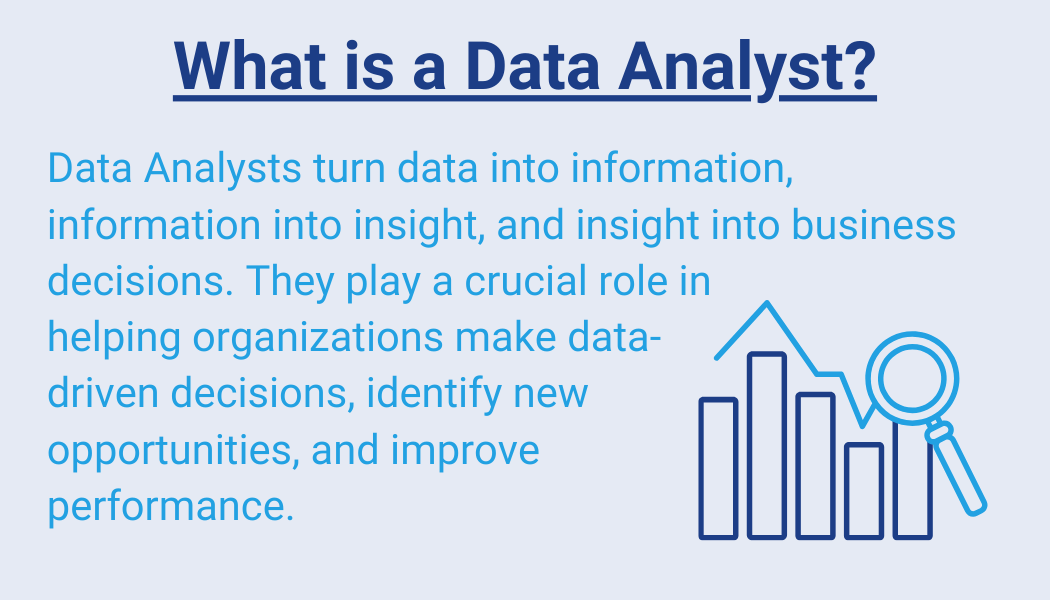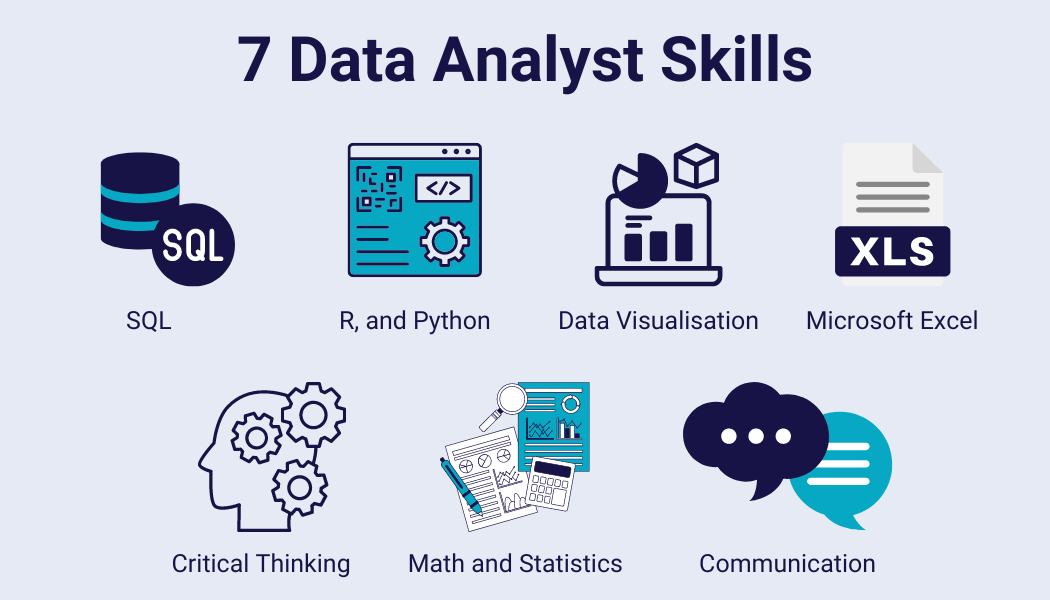
Author: Kysha Praciak
· 5 mins read · 493 views
Becoming a Data Analyst in 6 Simple Steps
Are you interested in becoming a data analyst? In this blog post, we will guide you through a simple, step-by-step process to master the path to success in this field. With just six straightforward steps, you can embark on a rewarding career as a data analyst and unlock a world of opportunities in the industry.

The Importance of Becoming a Data Analyst
Data analysis has become crucial for modern businesses as technology generates vast amounts of data. Becoming a skilled data analyst is essential in today’s competitive landscape, as they can unlock career opportunities and contribute to informed decision-making processes. Data analysts play a pivotal role in transforming raw information into actionable knowledge by gathering, organizing, and interpreting large volumes of data efficiently. Their ability to uncover patterns and trends within datasets helps companies make informed predictions and optimize their operations. To become proficient, data analysts need technical skills like programming languages (e.g., Python or R), strong analytical abilities, domain-specific knowledge, and excellent communication skills.
6 Steps to Becoming a Data Analyst
1. Understanding the Role of a Data Analyst
- Data analysts collect, analyze, and interpret large datasets to help organizations make informed decisions.
- They work with various types of data, such as customer demographics and market trends.
- Strong analytical skills are necessary to identify patterns and evaluate information accurately.
- Attention to detail is also important as small errors can significantly impact analysis outcomes.
- Staying updated with the latest technologies and programming languages like Python or R enhances data analysts’ abilities.
- Developing strong analytical skills and knowledge in statistics and programming languages are key steps towards mastering this profession.
2. Developing Strong Analytical Skills for Success as a Data Analyst
- It is crucial to develop strong analytical skills, this involves gathering and analyzing large datasets to extract meaningful insights and make informed decisions.
- To enhance your abilities, familiarize yourself with various analytical techniques, stay updated with the latest tools and technologies, practice problem-solving exercises regularly, and seek real-world experience.
- Mastering these skills takes time and dedication but can lead to fulfilling career opportunities in data analysis.
3. Acquiring Knowledge in Statistics and Mathematics for Effective Analysis
- It is crucial to have a strong foundation in statistics and mathematics, these subjects enable effective analysis by providing tools such as probability theory, regression analysis, and sampling techniques.
- Proficiency in mathematics allows the application of mathematical models and algorithms to analyze patterns within datasets.
- Acquiring knowledge in these areas can be done through formal education programs, online courses, self-study materials, and collaborative learning experiences.
- Continuously expanding understanding of statistics and mathematics enhances analytical skills over time, setting one apart from others in the field.
4. Mastering Programming Languages Relevant to Data Analysis
- In the journey to becoming a successful data analyst it is crucial to master programming languages like Python, R, and SQL.
- These languages are widely used for tasks such as data manipulation, statistical analysis, and creating visualizations.
- Python’s simplicity and versatility make it popular among data analysts, while R offers extensive packages for statistical computing and graphics.
- SQL is essential for working with relational databases.
- Mastering these languages enhances technical skills and efficiency in handling real-world datasets, ultimately leading to success as a data analyst.
5. Gaining Experience through Internships or Real-World Projects as a Data Analyst
- Gaining hands-on experience through internships or real-world projects is crucial for data analysts to develop practical skills and apply theoretical knowledge.
- These opportunities provide exposure to the field, allow collaboration with experienced professionals, and offer chances to solve analytical problems.
- Internships and projects also help in networking and establishing connections within the industry.
- Reflecting on challenges encountered during these experiences enhances problem-solving abilities and demonstrates commitment to the field.
- Overall, obtaining experience through internships or real-world projects is essential for success as a data analyst, showcasing practical skills, knowledge application, and industry connections.
6. Building an Impressive Portfolio to Showcase Your Skills as a Data Analyst
- To create an effective portfolio, focus on showcasing relevant projects that demonstrate your ability to analyze data and draw valuable insights.
- Include detailed explanations of each project’s objectives, methodologies used, and outcomes achieved.
- Additionally, consider including any publications or presentations you have contributed to in the field of data analysis to showcase your communication skills.
- Regularly update your portfolio with new projects and experiences to show continuous learning and staying up-to-date with industry trends.
- Choose projects carefully based on their relevance and impact to strike a balance between technical expertise and real-world applications.

Key Strategies for Landing Your Dream Job as a Data Analyst
- Attend industry events and connect with professionals who can provide valuable insights and potential job opportunities.
- Stay updated with the latest advancements in technology and tools used in data analysis by regularly attending workshops and conferences.
- Consider obtaining relevant certifications such as Certified Analytics Professional (CAP) or Microsoft Certified: Data Analyst Associate to showcase your expertise and commitment to continuous learning.
- Tailor your resume and cover letter to highlight your specific skills and experiences related to data analysis positions.
- Prepare for interviews by researching common interview questions in the field of data analysis and practicing your responses accordingly.
- During interviews, demonstrate not only technical proficiency but also effective communication skills as they are highly valued in this profession.
- Leverage online platforms such as LinkedIn by creating a professional profile that showcases your skills as a data analyst along with recommendations from colleagues or mentors.
- Keep applying for positions even if rejections come your way.
Tips for Continuous Learning and Professional Development in the Field of Data Analysis
- Stay Updated: Keep yourself informed about the latest trends, technologies, and techniques in data analysis.
- Take Online Courses: Enroll in online courses or virtual training programs that offer specialized knowledge and skills relevant to data analysis.
- Join Professional Associations: Become a member of professional associations related to data analysis such as Data Science Association or International Institute of Business Analysis (IIBA).
- Participate in Webinars: Attend webinars hosted by industry leaders or subject matter experts who share their insights and experiences in data analysis.
- Read Industry Publications: Subscribe to reputable publications that focus on data analysis topics such as Harvard Business Review or Data Analyst Journal.
- Seek Mentors: Find experienced professionals who can guide you on your career journey as a data analyst.
- Collaborate with Peers: Engage with other data analysts through online forums or local meetups where you can exchange ideas, discuss best practices, and learn from each other’s experiences.
- Embrace Continuous Improvement: Cultivate a growth mindset by seeking feedback and actively working on areas for improvement.
- Practice Real-World Projects: Apply your knowledge and skills by working on real-world data analysis projects.
Embrace the Path to Becoming a Successful Data Analyst
Becoming a data analyst offers exciting career prospects and opportunities for growth. This article outlines six steps to master the path, including understanding the role, developing analytical skills, acquiring knowledge in statistics and programming languages, gaining practical experience through internships or projects, and building an impressive portfolio. By following these steps and continuously expanding your skill set, you can position yourself for success in this high-demand field.
Looking for Expert IT Solutions?
Subscribe to Our Newsletter for Exclusive Tips and Updates!
Stay ahead of tech challenges with expert insights delivered straight to your inbox. From solving network issues to enhancing cybersecurity and streamlining software integration, our newsletter offers practical advice and the latest IT trends. Sign up today and let us help you make technology work seamlessly for your business!
References:
Coursera. (2023). What Does a Data Analyst Do? Your 2024 Career Guide. What Does a Data Analyst Do? Your 2024 Career Guide
LinkedIn Learning. (2023). Become a Data Analyst. https://www.linkedin.com/learning/paths/become-a-data-analyst



Share